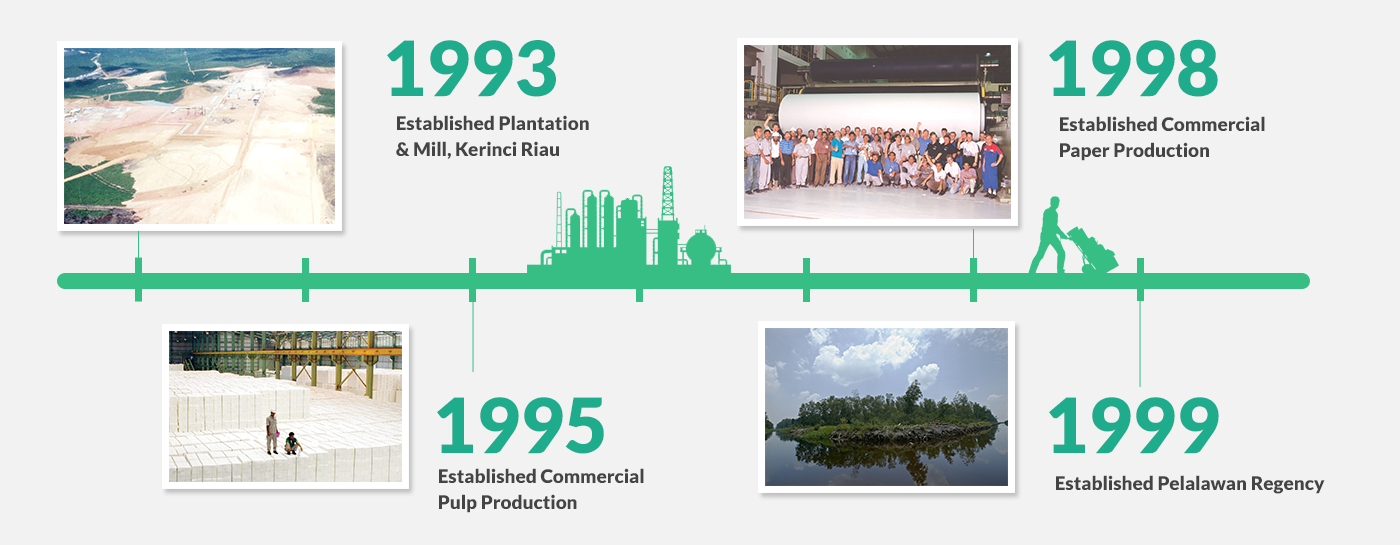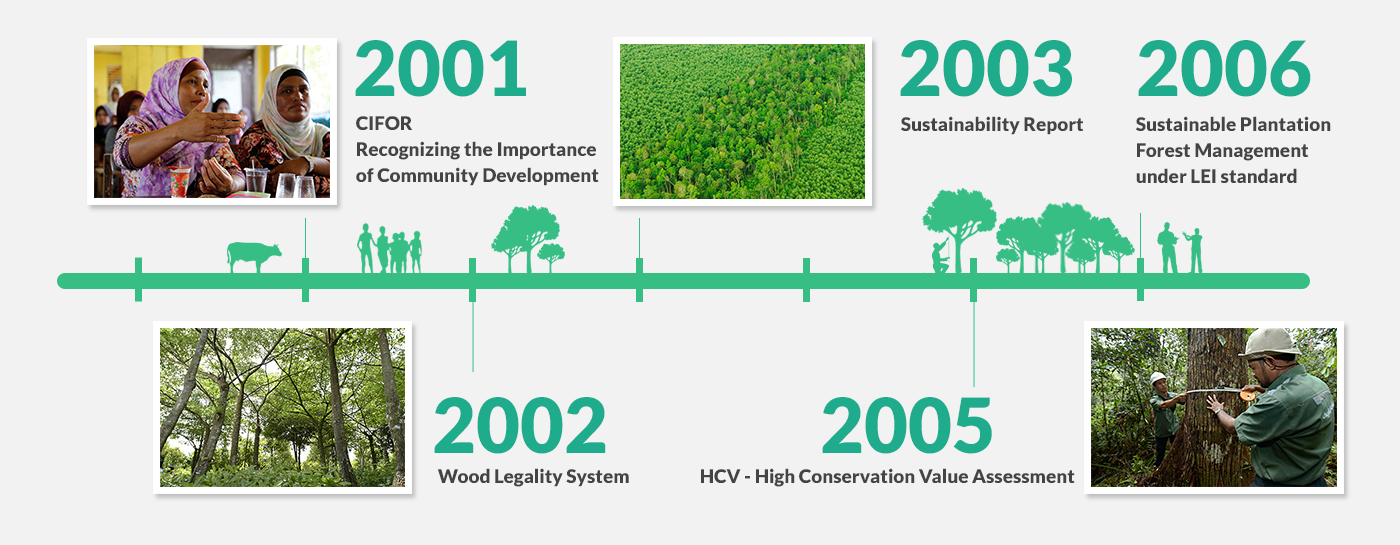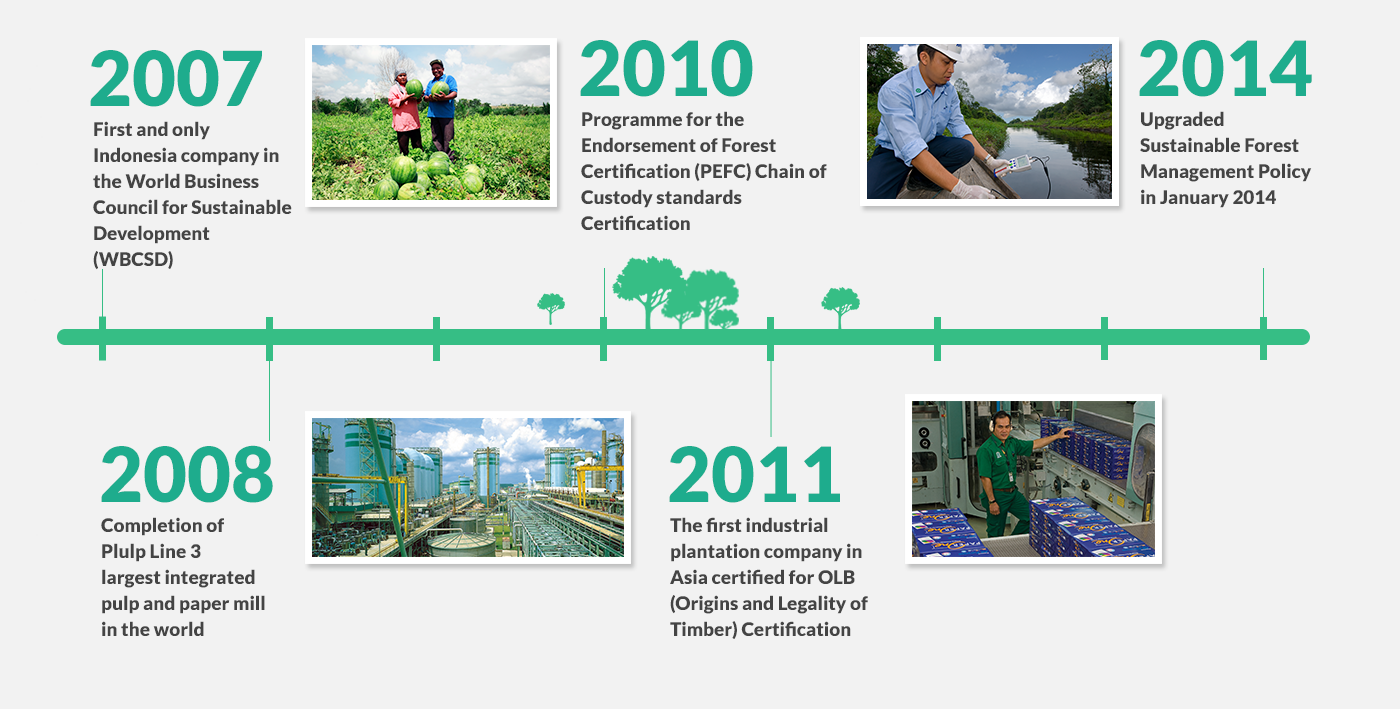History
Founding Vision
Asia Pacific Resources International Holdings Ltd (APRIL), is a member of RGE Group which was founded by Sukanto Tanoto in 1973. Under his leadership, RGE Group has grown into a global group employing more than 70,000 people, with assets totalling more than US$35 billion and worldwide sales reach.
An advocate of a responsible corporate citizenship, APRIL and its subsidiaries (APRIL Group) embraces Mr. Sukanto Tanoto's 5C's: that is, to operate in a manner that is good for Community, good for Country, good for Climate, good for Customer and good for Company. Accordingly, corporate social responsibility is woven into APRIL Group’s operations and management to advance environmental and community development and to fulfil the social responsibilities of a corporation. The Tanoto Foundation, established in 1981, implements this vision.
A Path to Prosperity

Through its subsidiaries in Indonesia, APRIL Group began plantation development in Sumatra’s Riau province and mill construction at Pelalawan Kerinci from 1993. At this time, the Kerinci Township was home to 200 households; a population that would grow to more than 200,000 by 2010 as APRIL Group’s business expanded and diversified, transforming Kerinci into a social and commercial regional hub.
Commercial pulp production commenced in 1995, followed by commercial paper production in 1998. From the beginning, the region’s growth would mirror the growth of APRIL Group’s operations in Indonesia, with the Pelalawan Regency established in 1999, followed by the establishment of the Pelalawan Kerinci District with the Pelalawan Regency in 2001. Kerinci’s continued growth would see its division into three areas in 2005.
In 2010, APRIL Group’s forestry operations was measured to contribute 6.9% of Riau Province’s total economic output. APRIL Group have created approximately 90,000 employment opportunities, which when coupled with its initiative to deliver better access to education and social support in areas such as healthcare and housing, has seen improved living standards and a reduction in poverty levels of 30%.
Sowing the Seeds of Sustainable Forestry

Recognising the importance of community development as part of a long-term approach to sustainable business, APRIL Group also rolled out a series of economic development initiatives to assist the development of small and medium local enterprises (SMEs).
In 2002, APRIL Group implemented a comprehensive wood legality system that prevents illegal wood from entering the supply and production chains. The system verifies and traces wood from the company’s fibre plantation through to the mill site. APRIL Group also collaborated with World Wildlife Fund (WWF) to address illegal logging in Tesso Nilo and inked a moratorium on further road building and Acacia plantation development in the Tesso Nilo area. In the same year, APRIL Group achieved ISO 14001 certification for all its fibre estates and pulp and paper mills.
In 2003, a decade after the company was established, APRIL Group published its first Sustainability Report, uniting the story of its community development initiatives alongside its commitment to sustainable forestry operations. In the same year, APRIL Group set up a Guangzhou branch to support growing operations in China.
In 2005, APRIL Group introduced voluntary High Conservation Value assessments on its concessions for land use planning. The policy provides practical and responsible solutions to the challenges of deforestation and degradation. The APRIL Learning Institute was also established and APRIL Group received Green Proper Rating for environmental performance of mill as well as the Golden Flag Awards & Zero Accident Award for health and safety management at the mill from the Indonesian Government.
Growth and Recognition

In 2006, APRIL Group became a signatory to Principles of the UN Global Compact. In the same year, PT Riau Andalan Pulp & Paper (RAPP), a subsidiary of APRIL, was certified for Sustainable Plantation Forest Management (SPFM) under the Indonesian Ecolabel Institute’s (LEI) standards. It was successfully re-certified under SPFM-LEI again in 2011 for a further five years.
In 2007, APRIL through its subsidiaries became the first and only Indonesia company admitted to the World Business Council for Sustainable Development (WBCSD).
The 2008 completion of Pulp Line 3 made Riau home to the largest integrated pulp and paper mill in the world, with a production capacity of 4 million tons per annum. The certified ISO 9001:8000 and ISO 14001 mills continued to invest in technology to ensure self-sufficient energy generation.
Since 2010, APRIL Group’s production facilities have been certified under the Programme for the Endorsement of Forest Certification (PEFC) Chain of Custody standards, ensuring that all raw materials coming into the mill are supplied from legal and from non-controversial sources. APRIL also received certification from Hong Kong Green Label for its PaperOneTM product in 2010.
In October 2011, RAPP, a subsidiary of APRIL, was successfully certified by Bureau Veritas’ standards for Origins and Legality of Timber (OLB), the first industrial plantation company in Asia to receive this certification. APRIL Group’s OLB Standards for Forestry Companies certification covers its forestry operations and production facilities. RAPP’s supply partners also successfully passed audits under OLB ‘Chain of Custody-Acceptable Wood’ Standards.
Pathway to a Sustainable Future
APRIL Group launched an upgraded Sustainable Forest Management Policy in January 2014. The new policy underlined APRIL Group’s commitment to balancing the need to safeguard the environment and enhancing the interests of local communities, while continuing to operate a sustainable business. An independent Stakeholder Advisory Committee was also introduced to ensure transparency and the implementation of the Sustainable Forest Management Policy.
In June 2015, APRIL Group evolved its Sustainable Forest Management Policy following input from the SAC and a range of stakeholders, further strengthening its forest protection and conservation commitments including the elimination of deforestation from its supply chain and the addition of High Carbon Stock assessments.

